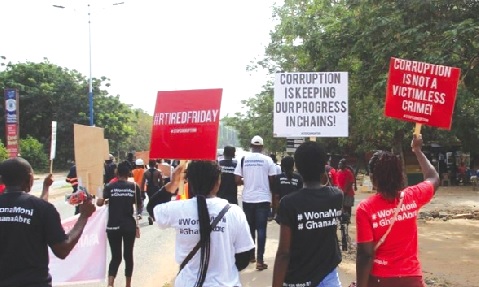
50 Years of corruption and democracy in Ghana
FIFTY years ago, Ghana had a military government.
Today, Ghanaians have experienced three decades of democracy, living in a constitutionally derived, liberal democratic regime.
In 1974, Ghana experienced widespread corruption, severely undermining development. In 2024, Ghana experiences widespread corruption, severely undermining development.
Leading presidential candidates, the New Patriotic Party’s Dr Mahamudu Bawumia and the National Democratic Congress’s John Dramani Mahama, both pledge to crack down on corruption if elected president on December 7.
Explosive entry
Ghana has been here before – many times. Jerry John Rawlings’ explosive entry onto the political scene in the late 1970s was closely linked to the perceived, dire state of corruption in the country, a situation which, many believed, was exacerbated by the military regime of General Ignatius Kutu Acheampong, Head of State between 1972 and 1978.
Despite Rawlings’ undemocratic seizing of power on June 4, 1979, many Ghanaians regarded his takeover as just. For many, he represented hope that something could be done to ameliorate Ghana’s corruption and economic decline.
Rawlings accused preceding administrations, both military and civilian, of large-scale corruption.
The civilian government of Dr Hilla Limann sought to silence him, strongly encouraging him to leave Ghana on a scholarship, which he refused to do. On December 31, 1981, Rawlings returned to power via a coup d'état. Contemporaneously, The New York Times quoted Rawlings, who claimed Limann and his associates were ‘a pack of criminals who bled Ghana to the bone’, and vowed ‘to organise this country in such a way that nothing will be done, whether by God or the devil, without the consent and authority of the people’.
Economic decline
Rawlings’ criticisms rang true for many ordinary Ghanaians, suffering from a decade-long economic decline and the effects of poor and ineffective governments, both civilian and military.
Successive regimes had implemented economically self-defeating policies to deal with Ghana’s serious economic plight. Some were autarchic policies – such as General Acheampong’s ‘Operation Feed Yourself’ and ‘Operation Keep Right’ – which led to brief, often localised, economic successes.
Overall, however, they were unable to address Ghana’s economic decline.
Actions of illegality – including, high-level and egregious corruption, smuggling and profiteering, known generically as kalabule – were so commonplace that few people in positions of authority were immune from accusations of corruption.
From the top down, entire sections of society – including, senior members of the armed forces, market traders and government officials – were widely seen as criminals, increasingly targeted through legal and social sanctions.
This was the central theme of the brief period of Rawlings’ Armed Forces Revolutionary Council’s (AFRC) ‘housecleaning’ between June and September 1979.
The AFRC claimed to want to ameliorate economic hardships experienced by the vast majority of Ghana’s population, especially the poor. Lacking a clear ideology, the AFRC’s rhetoric was moralistic in tone: if only Ghanaians would behave honestly, then all would be well.
Rawlings returned to power on 31 December 1981, again by coup d'état. Later, compelled by internal and external pressures, he announced a return to democracy, following a referendum in 1992. The Fourth Republic was instituted in January 1993.
Corruption problem
Three decades later, Ghana still has a serious corruption problem which, many believe, is getting (even) worse.
Popular frustration erupted in June 2022. Accra saw demonstrations against the cost of living, price inflation and government corruption.
Hundreds of people took to the streets, led by opposition politicians Sammy Gyamfi, National Communications Officer of the NDC;, Bernard Mornah, a former chairman of the People’s National Convention; and Rex Omar, the well-known highlife musician.
Twenty-nine people were arrested at the demonstration and 12 police officers were reportedly injured in clashes, blaming it on demonstrators throwing stones at them.
Similar events followed later in 2022, with a similar theme: the fast-rising cost of living and accusations of corruption at the highest levels of Ghana’s government. Soaring price inflation made it extremely difficult for ordinary people to get by, with around 25 per cent of Ghana’s 30 million people surviving on around US$2 a day.
Today, both leading presidential candidates speak loudly about what they would do to control and diminish corruption if elected. In June, Dr Bawumia reiterated his commitment to fighting against corruption, stating it is a major hindrance to national development.
He stressed that his commitment is demonstrated by what he has done so far as Vice-President in the fight against corruption through digitalisation. Dr Bawumia also noted that corruption can be fought by putting in place effective systems to prevent it, and not through traditional lip service to fighting it.
Mr Mahama restated in early July his strong commitment to fighting corruption if elected. His government would create a value-for-money office as part of an elaborate anti-corruption mechanism for national governance.
“One of our key policies will be to set up an independent value-for-money office to scrutinise all government procurements above the $5 million threshold or as shall be recommended by Parliament,” he said, adding, “If we want to eliminate corruption, we must increase accountability in government procurement processes. Accountability gives power back to the people.”
Nearly half a century ago, Jerry John Rawlings also said that he wanted to give power back to the people and eliminate corruption. He failed on both counts, and today corruption is worse than ever.
Recent events in Kenya indicate that when things go wrong, and the people no longer believe in government promises, then things can turn ugly. It is to be hoped that whoever becomes Ghana’s next president puts their money where their mouth is and deals effectively and swiftly with the canker of corruption.
The writer is an Emeritus Professor of Politics, London Metropolitan University.
Email:
